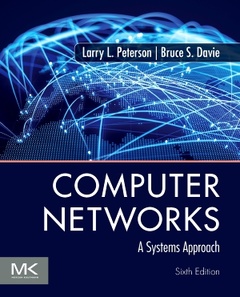Description
Computer Networks (6th Ed.)
A Systems Approach
The Morgan Kaufmann Series in Networking Series
Authors: Peterson Larry L., Davie Bruce S.
Language: English
Subject for Computer Networks:
Keywords
network applications; scalable connectivity; network architecture; networking protocols; internet architecture; application programming interface; bandwidth; high-speed networks; cloud computing; byte-oriented protocols; clock-based framing; SONET; error detection; multiple access networks; wireless; Bluetooth; switching; bridging; datagrams; subnetting; virtual networks; routing; multicast; TCP extensions; remote procedure call; random early detection; congestion; markup languages; lossless com
Approximative price 115.88 €
In Print (Delivery period: 14 days).
Add to cart848 p. · 19.1x23.5 cm · Paperback
Description
/li>Contents
/li>Readership
/li>Biography
/li>
Computer Networks: A Systems Approach, Sixth Edition explores the key principles of computer networking, using real world examples from network and protocol design. Using the Internet as the primary example, this best-selling classic textbook explains various protocols and networking technologies. The systems-oriented approach encourages students to think about how individual network components fit into a larger, complex system of interactions. This sixth edition contains completely updated content with expanded coverage of the topics of utmost importance to networking professionals and students, as provided by numerous contributors via a unique open source model developed jointly by the authors and publisher.
Hallmark features of the book are retained, including chapter problem statements, which introduce issues to be examined; shaded sidebars that elaborate on a topic or introduce a related advanced topic; What?s Next? discussions that deal with emerging issues in research, the commercial world, or society; and exercises. This book is intended primarily for graduate or upper-division undergraduate classes in computer networking. It will also be useful for industry professionals retraining for network-related assignments, as well as for network practitioners seeking to understand the workings of network protocols and the big picture of networking.
- Features completely updated content with expanded coverage of the topics of utmost importance to students and networking professionals
- Includes coverage of WiFi and cellular communication, security and cryptography, multimedia, and other applications
- Includes expanded guidelines for instructors who prefer to teach networking using a "top-down" approach
- Features chapter problem statements which introduce issues to be examined and shaded sidebars that elaborate on topics and introduce related ones
1. Foundation 2. Getting Connected 3. Internetworking 4. Advanced Internetworking 5. End-to-End Protocols 6. Congestion Control and Resource Allocation 7. End-to-End Data 8. Network Security 9. Applications
Bruce Davie is a visiting lecturer at MIT, and Chief Service Provider Architect at Nicira Networks. Formerly a Fellow at Cisco Systems, for many years he led the team of architects responsible for Multiprotocol Label Switching and IP Quality of Service. He is also an active participant in the Internet Engineering Task Force and he is curently SIGCOMM Chair. Prior to joining Cisco he was director of internetworking research and chief scientist at Bell Communications Research. Bruce holds a Ph.D. in Computer Science from Edinburgh University. He was named an ACM Fellow in 2009. His research interests include routing, network virtualization, transport protocols, and software-defined networks.
These books may interest you

Computer NetworksA Systems Approach 115.88 €



